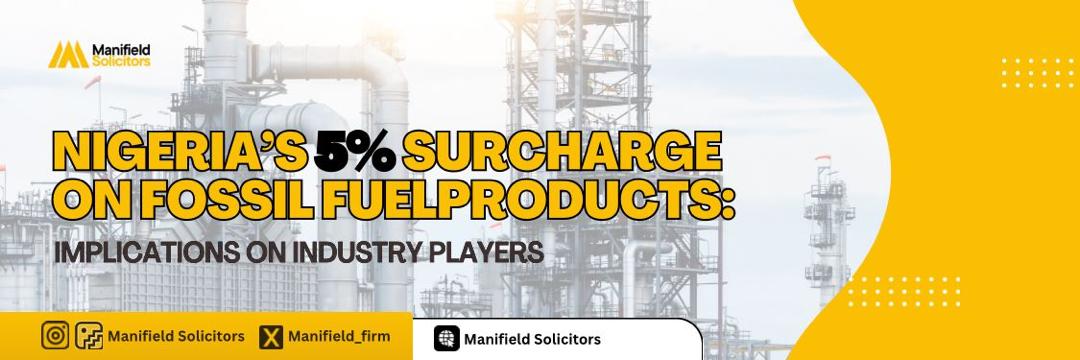In an earlier newsletter post titled, “Nigeria’s 2025 New Tax Law: Major Reforms & What They Mean for You,” we examined the sweeping fiscal changes introduced by the 2025 tax reforms. Building on that foundation, this update highlights a key sector-specific development: the introduction of a 5% Surcharge targeted at the Oil & Gas industry. It is important to distinguish this new consumption-based surcharge from the separate 4% Development Levy on assessable profits, as both are distinct components of the new fiscal landscape. This surcharge underscores the Federal Government’s determination to widen its revenue base by targeting consumption within a modernized tax system.
Overview of the 5% Surcharge
Under the Nigeria Tax Act 2025,[1] the 5% Surcharge is a new levy imposed on specific fossil fuel products provided or produced in Nigeria and shall be collected at the time a chargeable transaction occurs (point of sale). It is crucial to note that under the Nigeria Tax Act 2025[2], this is a consumption-based tax calculated on the retail price of the product, not a tax on the profits of oil and gas companies.
The policy requires the surcharge to be applied to every chargeable transaction, defined as the supply, sale, or payment for the product, whichever occurs first[3]. This means Nigerians will pay an additional 5% on every litre of applicable fuel purchased at the pump.
However, the Act explicitly exempts certain products, including household kerosene, cooking gas (LPG), and compressed natural gas (CNG)[4].
While the 5% Surcharge introduced by the Nigeria Tax Act 2025 represents a new and modernized fiscal tool, it is not entirely without precedent in Nigerian tax policy. Nigeria has seen a 5% pump-price user charge before. Section 14(1)(h) of the FERMA (Amendment) Act, 2007 provided a 5% user charge on the pump price of petrol and diesel, split 40% FERMA / 60% State Road Agencies. The NTA’s surcharge is a modernised, centralised instrument and the new Acts clarify precedence where conflicts arise.
Key Features
- Rate: A flat 5% on chargeable fossil fuel products.
- Base: The surcharge is computed based on the retail price of all “chargeable fossil fuel products” This is distinct from the 4% Development Levy, which is calculated on the assessable profits of companies.
- Scope: It applies to fossil fuel products provided or produced in Nigeria. Exemptions include clean/renewable energy products, household kerosene, cooking gas, and CNG.
- Effective Date: The surcharge will take effect on a future date to be specified by the Minister of Finance through an Order published in the Official Gazette[5].
- Administration: The tax will be administered and collected by the newly established Nigeria Revenue Service (NRS)[6], established under the Nigeria Revenue Service (Establishment) Act, 2025[7], with collection occurring on a monthly basis.
Economic and Sectoral Impact
1. Upstream and Midstream Operators:
While the 5% surcharge is not a direct tax on profits, it will indirectly impact operators by potentially influencing domestic demand due to higher end-user prices. The more direct fiscal impact on these operators comes from the 4% Development Levy, which is applied directly to their assessable profits which are factored into projects[8].
2. Downstream Operators:
Marketers and distributors will be at the forefront of implementing this surcharge, as it is collected at the retail point of sale. This will necessitate adjustments to pricing mechanisms and could tighten margins in a highly competitive sector.
3. Foreign Direct Investment (FDI):
While the broader reforms aim to simplify the tax regime, any new levy on the sector’s primary output can create short-term concerns among international investors regarding Nigeria’s fiscal stability and predictability. Transparent implementation will be crucial to maintaining investor confidence.
4. Government Revenue:
The surcharge is a key pillar of the government’s strategy to boost non-oil revenue. levying a charge on widely consumed fossil fuel products, will create a steady income stream to support economic development. Additionally, by integrating digital tax administration through the newly established Nigeria Revenue Service (NRS), the government aims to ensure more efficient collection and compliance.
5. Consumer Implications:
This policy directly impacts consumers and businesses who rely heavily on fuel for transportation and power generation. As a tax on the final retail price, the additional cost is expected to directly increase transportation fares and the operational costs for businesses, potentially contributing to a higher cost of living.
Strategic Considerations for Industry Players
- Financial and Market Analysis: Given that the new 5% Surcharge is a consumption tax calculated directly on the final retail price of fuel, companies in the downstream sector must model the potential impact of these higher prices on consumer demand. This analysis is crucial for adjusting their sales projections to reflect a likely decrease in sales volume. Concurrently, they must revise their cash flow forecasts to account for both the anticipated reduction in revenue (cash inflow) and the new monthly obligation to remit the collected surcharge to the Nigeria Revenue Service (a new cash outflow).
- Upstream and Midstream Market Risk Assessment: The 5% increase in the retail price of fuel could lead to a reduction in overall domestic fuel consumption. This decrease in demand would ripple backward through the value chain, potentially affecting Upstream and Midstream Operators by impacting production quotas and lowering demand for refined products leading to reduced refinery throughput. This is an indirect, market-driven effect, not a direct tax obligation.
- Supply Chain and Contractual Adjustments: Fuel supply and distribution agreements may require review to clearly delineate the responsibility for collecting and remitting the surcharge.
- Returns and Compliance: The Nigeria Tax Administration Act, 2025[9] mandates monthly returns to the Service (Nigeria Revenue Service) for the surcharge, typically due by the 21st day of the following month. Timely remittances are critical to maintain compliance as non-compliance attracts significant administrative penalty of ₦10,000,000, as well as a sum equal to 10% of the amount payable in addition to the surcharge due[10]. It is advised that these filings and payments are treated as “must-not-miss” obligations within internal compliance calendars.
Conclusion
The 5% Surcharge on fossil fuels is a significant policy shift, placing the tax burden on the point of consumption. While the surcharge aims to broaden the government’s revenue base, its success will depend on careful management of its inflationary impact on the economy. For all industry players, understanding the precise mechanics of this new levy, alongside the enhanced compliance framework under the Nigeria Tax Administration Act and Nigeria Revenue Service Establishment Act, is essential for proactive financial planning and risk management ahead of its implementation.
[1] Sec 159
[2] Sec 160(2)
[3] Sec 160 (1)
[4] Sec 162(1)
[5] Sec 161(1)
[6] Sec 161(2)
[7] Sec 3
[8]Sec 59(1)
[9] Sec 24
[10] Sec 136(1)(2)







Add your first comment to this post